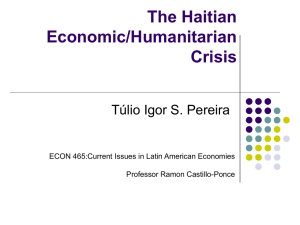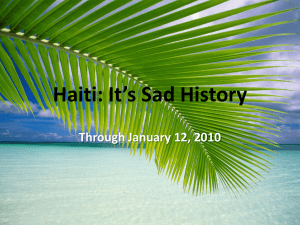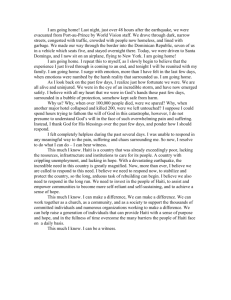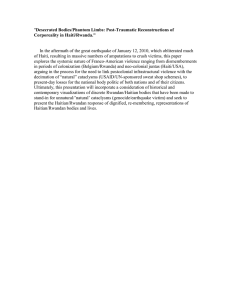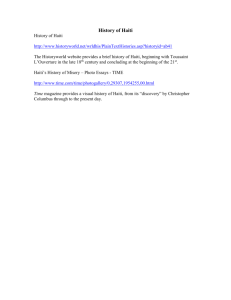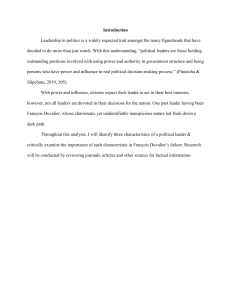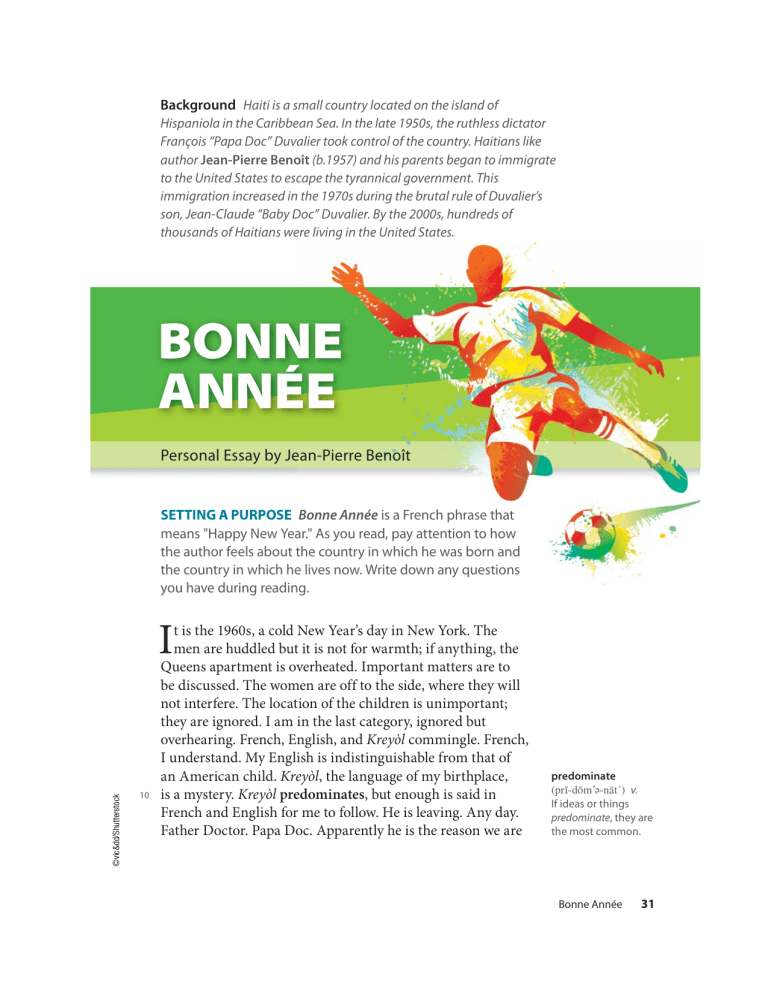
Background Haiti is a small country located on the island of Hispaniola in the Caribbean Sea. In the late 1950s, the ruthless dictator François “Papa Doc” Duvalier took control of the country. Haitians like author Jean-Pierre Benoît (b.1957) and his parents began to immigrate to the United States to escape the tyrannical government. This immigration increased in the 1970s during the brutal rule of Duvalier’s son, Jean-Claude “Baby Doc” Duvalier. By the 2000s, hundreds of thousands of Haitians were living in the United States. BONNE ANNÉE Personal Essay by Jean-Pierre Benoît SETTING A PURPOSE Bonne Année is a French phrase that means "Happy New Year." As you read, pay attention to how the author feels about the country in which he was born and the country in which he lives now. Write down any questions you have during reading. ©vic&dd/Shutterstock I 10 t is the 1960s, a cold New Year’s day in New York. The men are huddled but it is not for warmth; if anything, the Queens apartment is overheated. Important matters are to be discussed. The women are off to the side, where they will not interfere. The location of the children is unimportant; they are ignored. I am in the last category, ignored but overhearing. French, English, and Kreyòl commingle. French, I understand. My English is indistinguishable from that of an American child. Kreyòl, the language of my birthplace, is a mystery. Kreyòl predominates, but enough is said in French and English for me to follow. He is leaving. Any day. Father Doctor. Papa Doc. Apparently he is the reason we are predominate (pr∆-d≤m´∂-n∑t´) v. If ideas or things predominate, they are the most common. Bonne Année 31 20 30 40 in New York, not Port-au-Prince.1 And now he is leaving. And this will make all the difference. My father is clear. We are returning to Haiti. As soon as this man leaves. No need to await the end of the school year, although my schooling is otherwise so important. I have no memory of Haiti. No memory of my crib in Port-au-Prince, no memory of the neighbors’ children or the house in which we lived. My friends are in New York. My teachers are in New York. The Mets2 are in New York. I do not know Papa Doc, but our destinies are linked. If he leaves, I leave. I do not want him to leave. Another January first, another gathering. If it is the beginning of a new year, that is at best incidental. January first is the celebration of Haitian independence. A glorious day in world history, even if someone seems to have forgotten to tell the rest of the world. But it is not bygone glory that is of the moment. A new independence is dawning. It is more than just a rumor this time. Someone has inside information. It is a matter of months, weeks, maybe days, before Duvalier falls. I am one year older now, and I understand who Duvalier is. An evil man. A thief and a murderer. A monster who holds a nation prisoner. A man who tried to have my father killed. A man who will soon get his justice. My father is adamant, Duvalier’s days are numbered. And then we will return. Do I want to leave? I am old enough to realize that the question is unimportant. Go he must, but somehow he persists. A new year and he is still in power. But not for long. This time it is true. The signs are unmistakable, the gods have finally awoken. Or have they? After so many years, the debates intensify. Voices raised in excitement, in agitation, in Haitian cadences. Inevitably, hope triumphs over history. Or ancient history triumphs over recent history. Perhaps there will be a coup, Haitian exiles landing on the shores with plans and weapons, a well-timed assassination. We are not meant to be in this country. We did not want to come. We were forced to flee or die. Americans perceive 1 2 32 Port-au-Prince (pôrt´ ō-prĭns´): the capital of Haiti. The Mets: a professional baseball team in New York City. Collection 1 coup (k◊) n. A coup is the sudden overthrow of a government by a group of people. 50 60 “ desperate brown masses swarming at their golden shores, wildly inventing claims of persecution for the opportunity to flourish in this prosperous land. The view from beneath the bridge is somewhat different: reluctant refugees with an aching love of their forsaken homeland, of a homeland that has forsaken them, refugees who desire nothing more than to be home again. Then there are the children. Despite having been raised in the United States, I have no special love for this country. Despite the searing example of my elders, I am not even sure what it means to love a country. Clearly, it is not the government that one is to love. Is it then the land, the dirt and the grass, the rocks and the hills? The people? Are one people any better than another? I have no special love for this country, but neither do I desire a return to a birthplace that will, in fact, be no real return at all. If nothing else, the United States is the country that I know, English is my daily language. Another New Year, but I am not worried; we will not be back in Port-au-Prince anytime soon. With their crooked ruler the adults can no longer draw a straight line, but I can still connect the dots and see that they lead nowhere. persecution (pûr´s∆-ky◊´sh∂n) n. Persecution is the harsh treatment of others, often due to race or religion. We are not meant to be in this country. We did not want to come. We were forced to flee or die. II 70 The Haitian sun has made the cross-Atlantic journey to shine on her dispossessed children. This time it is not just wispy speculation, something has changed. It is spring 1971 and there is death to celebrate. The revolutionaries have not landed on the coast, the assassin’s poison has not found its blood. Nonetheless, Duvalier is dead. Unnaturally, he has died dispossess (d∆s´p∂-z≈s´) v. To dispossess someone is to deny him or her possession of something. Bonne Année 33 80 90 100 110 of natural causes. Only his laughable son remains. Bébé 3 Doc, Jean-Claude Duvalier. Everyone agrees that Bébé Doc will not be in power long enough to have his diapers changed. Laughable Bébé Doc may be, but it turns out to be a long joke, and a cruel one. The father lasted fourteen years, the son will last fifteen. Twenty-nine years is a brief time in the life of a country, but a long time in the life of its people. Twentynine years is a very long time in the life of an exile waiting to go home. Three years into Bébé Doc’s terrible reign there is news of a different sort. For the first time, Haiti has qualified for the World Cup. The inaugural game is against eternal powerhouse Italy. In 1974 there are not yet any soccer moms, there is no ESPN all-sports network. Americans do not know anything of soccer, and this World Cup match will not be televised. Yet America remains a land of immigrants. For an admission fee, the game will be shown at Madison Square Garden on four huge screens suspended in a boxlike arrangement high above the basketball floor. I go with my younger brother. In goal, Italy has the legendary Dino Zoff. Together they have not been scored upon in two years. The poor Haitians have no hope. And yet, Haitians hope even when there is no hope. The trisyllable cry of “HA-I-TI” fills the air. It meets a response, “I-TA-LIA,” twice as loud but destined to be replaced by an even louder HA-I-TI, followed by IT-A-LIA and again HA-I-TI in a spiraling crescendo. The game has not even started. My brother and I join in the cheer; every time Haiti touches the ball is cause for excitement. The first half ends scoreless. The Italian fans are nervous, but the Haitian fans are feeling buoyed. After all, Haiti could hardly be expected to score a goal, not when the Germans and the English and the Brazilians before them have failed to penetrate the Italian defense. At the same time, the unheralded Haitian defenders have held. The second half begins. Less than a minute has gone by and Emanuel Sanon, the left-winger for Haiti, has the ball. Less than twenty-four hours earlier he had foolhardily predicted that he will score. Zoff is fully aware of him. Sanon shoots. There is a split second of silence and then madness. 3 34 Bébé (b∂-b∑´): French word that means “baby.” Collection 1 (t) ©Bettmann/Corbis; (b) ©Corbis; (c) ©aldorado/Shutterstock Madison Square Garden is an indoor arena in New York City where games, concerts, boxing matches, and other sports and entertainment activities take place. It is shown here with the Haitian flag. 120 The ball is in the back of the net, Sanon has beaten Zoff. The Italians are in shock. The world is in shock. Haiti leads 1–0. “HA-I-TI, HA-I-TI.” Half of Madison Square Garden is delirious, half is uncomprehending. The Haitians are beating the Italians. Haiti is winning. Haiti is winning. For six minutes. Then the Italians come back to tie the score, 1–1. The Italians score again. And then again. The Haitians cannot respond. Italy wins 3–1. Still. Still, for six minutes Haiti is doing the impossible, Haiti is beating Italy. Italy, which twice has won the World Bonne Année 35 Cup. Six minutes. Perhaps the natal pull is stronger than it seems. For that one goal, that brief lead, those six minutes, mean more to me than all the victories of my favorite baseball team. III 130 140 February 7, 1986, amid massive protests in Haiti, Jean-Claude flees the country. There is a blizzard in New York, but this does not prevent jubilant Haitians from taking to the snowy streets, waving flags, honking horns, pouring champagne. Restaurants in Brooklyn serve up free food and drink. The Duvalier regime has finally come to an end. The New Year’s prediction has finally come true. If he leaves, I leave. In July, I fulfill my destiny, more or less. I return to Haiti, on an American passport, for a two-week visit. In October the Mets win their second World Series. The city celebrates with a tickertape parade attended by over two million people. A pale celebration indeed, compared to the celebrating that took place earlier in the year. COLLABORATIVE DISCUSSION With a partner, discuss whether a person’s homeland is the country where he or she is born, or the country where he or she is raised. Cite evidence from the text to support your ideas. 36 Collection 1 natal (n∑t´l) adj. If something is natal, it relates to birth.
